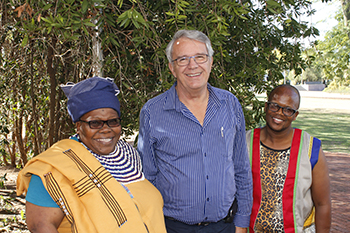Latest News Archive
Please select Category, Year, and then Month to display items
12 October 2020
|
Story Arina Engelbrecht
|
Photo Supplied
 Arina Engelbrecht from Organisational Development and Employee Well-being believes physical activity has a number of benefits for one’s health, including stress relief.
Arina Engelbrecht from Organisational Development and Employee Well-being believes physical activity has a number of benefits for one’s health, including stress relief.
Being physically active plays a big role in preventing the development of mental-health problems and in improving the quality of life of people experiencing mental-health problems.
Treatment for depression
Physical activity can be an alternative treatment for depression. It can be used as a stand-alone treatment or in combination with medication and/or psychological therapy. It promotes all kinds of changes in the brain, including neural growth, reduced inflammation, and new activity patterns are formed that promote feelings of calm and well-being. It releases endorphins – powerful chemicals in the brain that energise your spirit and make you feel good.
Physical activity can be very effective in relieving stress. Research in adults has found that physically active individuals tend to have lower stress levels compared to individuals who are less active. It also leads to improved sleep. When a person sleeps better and feels more rested, overall quality of life improves. They cope better with daily life stressors.
Reduce Alzheimer's risk
Regular physical activity can reduce your risk of developing Alzheimer's disease by up to 50%. It can also slow down further deterioration in those who have already started to develop cognitive problems. It stimulates the brain’s ability to maintain old connections as well as to make new ones.
A study asked people to rate their mood immediately after periods of physical activity (e.g. going for a walk/run, cycling, doing housework) and periods of inactivity (e.g. reading a book or watching television). Researchers found that participants felt more content, more awake, and calmer after being physically active compared to after periods of inactivity.
In conclusion, people who are physically active feel a sense of well-being, feel more energetic throughout the day, sleep better at night, have sharper memories, and feel more relaxed and positive about themselves and their lives.
“Being physically active not only changes your body, it changes your mind,
attitude, and your mood.” – Arina Engelbrecht
UFS Faculty of Theology hosts expert on African Traditional Religion (ATR)
2016-05-20

Dr Nokuzola Mndende, Prof Fanie Snyman (Dean of the Faculty of Theology), and Dr Luvuyo Ntombana (Department Head: Religion Studies) |
Dr Nokuzola Mndende, an acclaimed theologian, researcher, and practitioner of African Traditional Religion (ATR), is often called upon in the media to offer her expert opinion or participate in interfaith panel discussions. Thanks to an initiative from the postgraduate diploma class in the Faculty of Theology and the efforts of Dr Luvuyo Ntombana (Department Head: Religion Studies; Faculty of Theology), Dr Mndende accepted an invitation to present her paper, “From the periphery to the centre: African Traditional Religion in a democratic state”, on the Bloemfontein Campus of the University of the Free State (UFS). In his opening remarks, Dr Ntombana stated that he was heartened by his students’ desire to be “co-workers in knowledge production” by engaging with Dr Mndende.
Dr Mndende’s contention is that African Traditional Religion (ATR) was suppressed throughout colonial times, and, despite a 22-year-old democracy, continues to be moved to “beyond the periphery” by what she terms “spiritual subsets”; those who strive to amalgamate their African Traditional Religion rituals with the practices of Christianity. Quoting statistics from a 1995 survey by the SABC, she stated that ATR is a minority in its birthplace (with only 5% representation), and posed the question: “If ATR is a minority in its place of birth, where is it a majority?” Her presentation put forward the need to study and interpret ATR introspectively, but acknowledged that more “homework” would be needed in this regard.
Dr Mndende thanked the university, Dr Ntombana, and the Dean of the Faculty of Theology, Prof Fanie Snyman, for inviting her, and expressed a desire for the relationship with the UFS to continue.